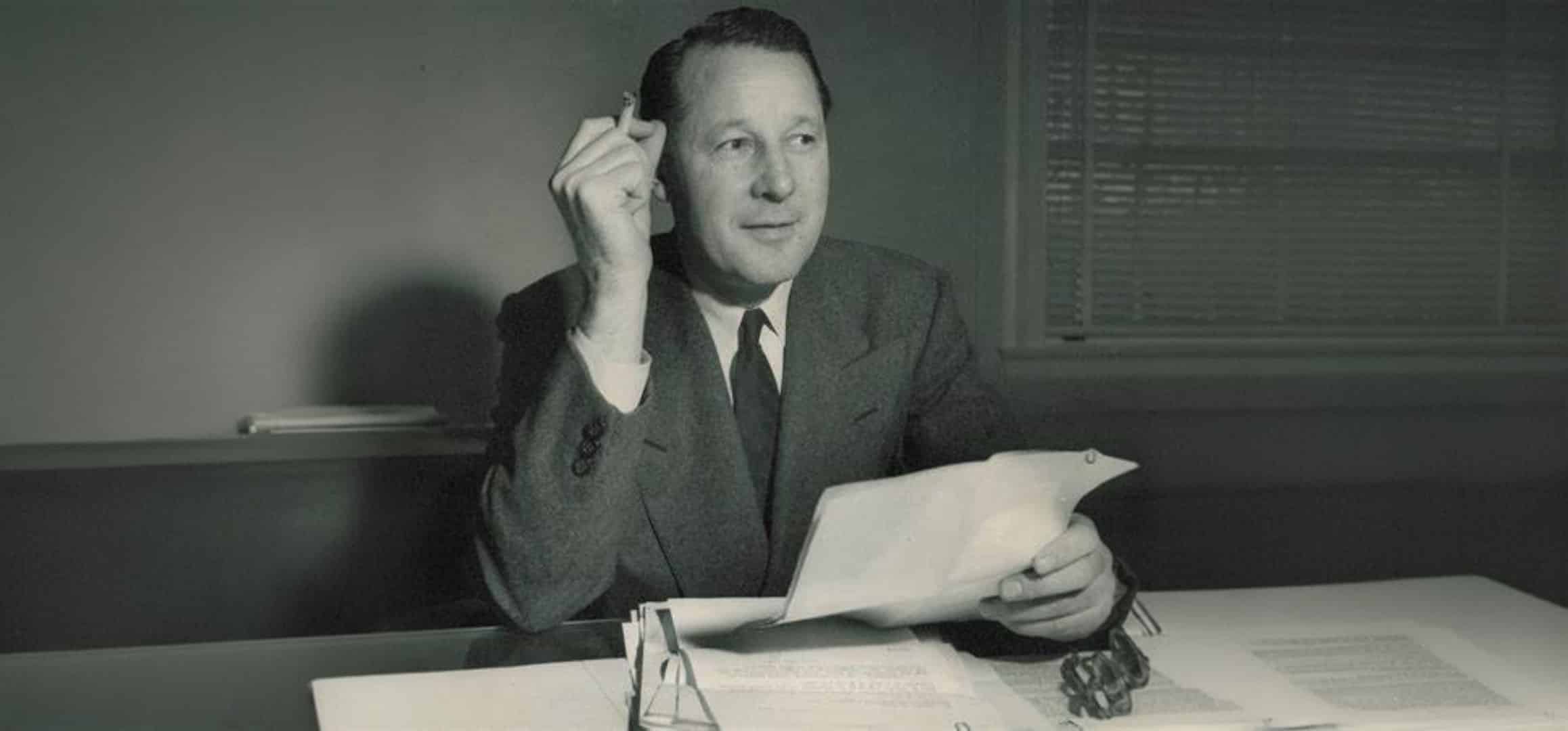Few twentieth‑century champions of laissez‑faire economics have cast a longer shadow than Leonard Edward Read. Born in Hubbardston, Michigan in 1898, Read founded the Foundation for Economic Education (FEE) and wrote nearly thirty books and hundreds of essays. He forged a link between nineteenth‑century classical liberals like Frédéric Bastiat and the modern libertarian movement. For Read, the cause of liberty was a moral calling as much as an economic doctrine; he believed that free markets required virtuous citizens and that the greatest work an individual can perform for society is to improve himself. On the 127th anniversary of his birth, it is worth tracing the ideas that shaped him and the influence he bequeathed to subsequent generations.
Read’s early life was rooted in self‑reliance. After serving in the First World War, he entered commerce and rose to manage the Western Division of the U.S. Chamber of Commerce. During the New Deal years, his faith in government planning began to waver. A confrontation with W. C. Mullendore of Southern California Edison left him unable to defend Chamber support for interventionism, spurring him to study the classical liberal tradition and to pen his first book, The Romance of Reality. Read soon discovered Frédéric Bastiat’s parables about unseen consequences and Ludwig von Mises’ Human Action, which exposed the fatal conceit of central planners. Another key mentor was Albert Jay Nock, whose essay “Isaiah’s Job” argued that social change is the work of a small “Remnant,” a moral and intellectual elite that keeps the flame of liberty alive when the masses are indifferent. Read embraced this thesis, writing that movements are always led by a tiny minority and that expecting a majority to master complex economic philosophy “would be like expecting a majority of adult Americans to compose symphonies.”
By the early 1940s Read was managing the Los Angeles Chamber of Commerce. His advocacy of economic freedom brought him into contact with New York University’s new graduate program in Austrian economics led by Mises. At Mises’ seminars, Read absorbed the argument that ideas, not interests, ultimately shape policy and that a free society must rest on private property and voluntary exchange. These influences steeled his conviction that liberty could not be imposed from above but must be cultivated through education and moral development.
Read’s most enduring work is his 1958 essay “I, Pencil.” Told from the perspective of a common pencil, the parable reveals how countless people cooperate without any planner to direct them. The narrator marvels that ordinary users assume such production is trivial. To correct this conceit, the pencil invites readers to consider that none of the millions of participants knows how to make a pencil by himself. In its closing lines, the essay distills its lesson: society’s legal apparatus should merely remove obstacles so that “creative energies” remain uninhibited. The miracle of the pencil’s creation proves that spontaneous cooperation succeeds when legal restraints are minimized. Read’s point is not that pencils arise by magic, but that no bureaucrat, however brilliant, could assemble the dispersed knowledge necessary to produce one. Therefore, he urges humility and trust in the “invisible hand” of voluntary exchange.
The unadorned elegance of “I, Pencil” captivated economists and educators. Nobel laureate Milton Friedman introduced the essay to millions through his 1980 television series Free to Choose. In the introduction to the Liberty Fund edition, he called it a classic that “succinctly, persuasively, and effectively illustrates the meaning of both Adam Smith’s invisible hand and Friedrich Hayek’s emphasis on the importance of dispersed knowledge.” Friedman used the story to show viewers that cooperation under a price system can coordinate people who speak different languages, practice different religions, and may even hate one another. That endorsement from one of the twentieth century’s most celebrated economists testifies to the enduring pedagogical power of Read’s parable.
Convinced that the battle for liberty would be won through persuasion rather than politics, Read founded the Foundation for Economic Education in 1946. FEE became the first major postwar organization dedicated to the ideas of limited government and free markets. FEE hosted seminars, published The Freeman magazine, and distributed pamphlets that explained inflation, rent control, and taxation in plain language. Read saw himself as a “light giver” rather than a political strategist; his goal was to inspire individuals to improve their understanding of freedom and to model the virtues necessary to sustain it. He was famously opposed to lobbying or partisan activity, believing that statecraft without soulcraft was futile.
Read’s emphasis on ideas attracted budding intellectuals. The economist Murray Rothbard later recalled that as a young man he stumbled upon FEE’s pamphlet “Roofs or Ceilings?,” co‑authored by Milton Friedman and George Stigler, which demolished arguments for rent control. That pamphlet led Rothbard to contact FEE and begin a long association with Read and Ludwig von Mises. Generations of college students and business people discovered Austrian economics and classical liberalism through FEE’s summer seminars and reading lists. Read encouraged his staff to distribute Bastiat’s The Law and Mises’s Human Action to anyone curious about economic principles, and he mentored young scholars like Israel Kirzner and Hans Sennholz, who would become prominent theorists in their own right. In this way, FEE functioned as a nursery for the modern libertarian movement, offering intellectual sustenance at a time when academic and political currents favored interventionism.
Read’s influence reached far beyond his own essays. Through FEE, he cultivated a network of writers, businessmen, and politicians who carried his message into mainstream discourse. Milton Friedman’s public admiration for “I, Pencil” is one example; another is President Ronald Reagan’s personal tribute. In a 1983 message commemorating Read’s dedication to liberty, Reagan wrote that the nation had been “vastly enriched by his devotion to the cause of freedom” and predicted that future generations would look to Read “for inspiration.” Reagan’s words underscored Read’s role in rekindling free‑market ideas during the Cold War when Keynesianism and central planning seemed ascendant.
Murray Rothbard, although later critical of some of FEE’s moderation, credited Read with introducing him to Mises and Austrian economics. Henry Hazlitt served on FEE’s board and wrote frequently for The Freeman. Israel Kirzner drew on Read’s insistence that markets are processes of discovery. By presenting economic education as a moral endeavor rather than a technical exercise, Read inspired his listeners to treat liberty as a first principle rather than a means to higher output.
While Read was a tireless promoter of the free market, he consistently stressed that liberty depends on character. He urged his readers to look inward before trying to reform society, emphasizing that “self‑responsible men are as good as imperfect men can be; we should trust free men.” Government’s proper role, he maintained, is to codify and enforce taboos against fraud and predation while leaving “everything creative” to individuals acting freely and cooperatively. In this view, voluntarism is not just an efficient way to allocate resources; it is an ethical imperative rooted in respect for human dignity. Read recognized that coercion, whether by a majority or an enlightened elite, corrupts both the coercer and the coerced. Therefore, he admonished liberty’s champions never to seek power for benevolent purposes, lest they become part of the problem they wish to solve.
Read’s faith in the free market was tempered by realism about human imperfection. He did not claim that markets are perfect or that businessmen are saints. Rather, he argued that voluntary arrangements harness self‑interest to serve others, whereas coercive schemes stifle creativity and breed resentment. Consequently, his admonition “Trust freedom? In the society of men there is nothing else to trust” remains a succinct summary of his worldview. At a time when public debate often oscillates between technocratic paternalism and populist centralism, Read’s insistence that liberty requires both moral self‑discipline and institutional restraint offers a refreshing alternative.
Leonard Read’s intellectual formation owed much to predecessors like Bastiat, Mises, and Nock, yet he did not merely transmit their doctrines. He blended Bastiat’s clarity, Mises’s methodological rigor, and Nock’s moral urgency into a uniquely American voice that resonated with businessmen and lay readers. His essay “I, Pencil” illustrated the miracle of spontaneous order; his founding of FEE provided an institutional home for free‑market education; his mentoring of scholars and activists created a multiplier effect. Through these endeavors, he became a prism through which the light of classical liberalism was refracted into new colors.
On this anniversary, it is tempting to consign Read to the pantheon of libertarian saints and move on. Yet his legacy is too dynamic for static reverence. He insisted that freedom could not be outsourced to think tanks or politicians; it must be internalized by every individual who values his own dignity. He reminded his readers that education is a never‑ending process and that no one knows enough to run other people’s lives. In an age when market coordination is both more miraculous and more taken for granted than ever, his plea to “leave all creative energies uninhibited” is as urgent as it was in 1958. For those who seek to understand how ideas shape institutions and how one person can ignite a movement, Leonard E. Read offers a compelling example.































